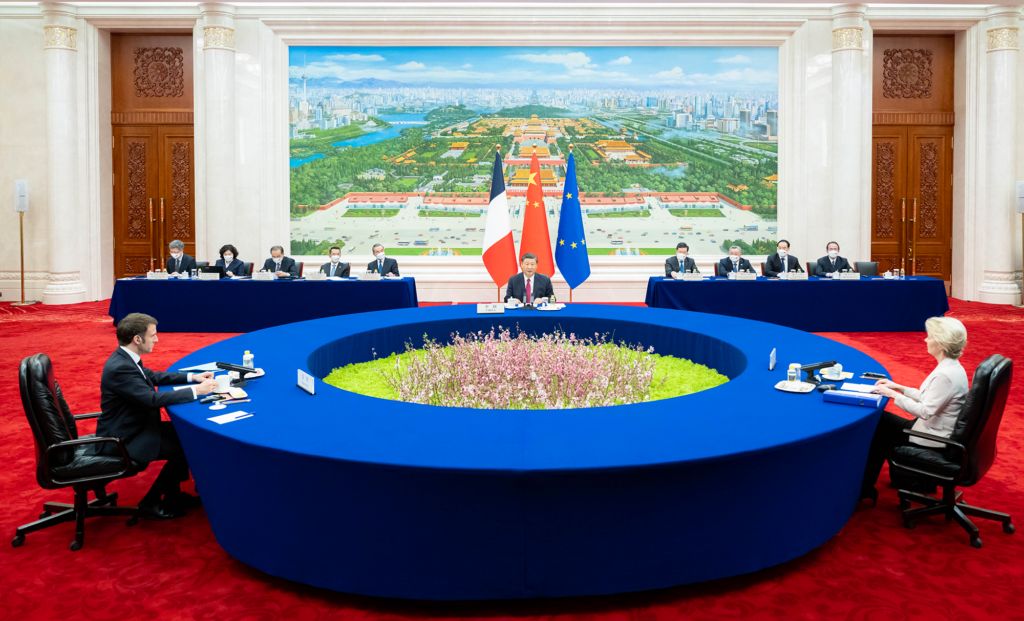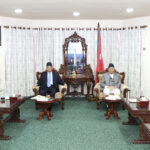Beijing’s call on Ukraine shows wisdom, capability in mediating peace
Observers said that China’s signal for enhancing cooperation during the two European leaders’ visit is set to stabilize relations and dispel certain concerns from Europe, at a juncture when the relations need to be restarted and boosted after the differences of recent years and lack of direct communication. Moreover, Xi’s proposed joint call with France on political settlement of the Ukraine crisis ushers in an important step for China and France to jointly push for a peaceful resolution of the ongoing crisis, and shows China’s wisdom and capability in mediating peace talks.
In meeting with Macron who is on a state visit to China on Thursday, Xi said China and France are permanent members of the UN Security Council and major countries with a tradition of independence. They are firm advocates for a multi-polar world and for greater democracy in international relations.
They have the ability and responsibility to rise above differences and obstacles, keep to the overall direction of a comprehensive strategic partnership that is stable, mutually beneficial, enterprising and dynamic, and practice true multilateralism for global peace, stability and prosperity, the Chinese president said.
Xi said Macron’s visit to China is the first by a European head of state after the full resumption of China’s exchanges with the world and the successful conclusion of China’s “two sessions.” The visit will inject new momentum and bring new vitality to China-Europe relations.
China supports Europe in achieving strategic autonomy, upholds that the China-Europe relationship is not targeted at, subjugated to, or controlled by any third party, and believes that Europe will take an independent approach to developing its relations with China, Xi said.
On Thursday afternoon, Xi also had a trilateral meeting with Macron and Ursula von der Leyen at the Great Hall of the People.
Xi pointed out that the concurrent visit to China by President Macron and President von der Leyen demonstrates the positive desire of the European Union (EU) to grow relations with China and advances the common interests of China and the EU.
In a complex and volatile world beset by the protracted Ukraine crisis, faltering global recovery, volatile financial markets and growing difficulties facing developing countries, China and the EU need to stay committed to dialogue and cooperation, uphold world peace and stability, foster common development and prosperity, promote human progress, and address global challenges together, Xi said.
Amid turbulence in the international community, positive signals from the meeting between leaders from China, France and the EU helped to stabilize relations, and dispel concerns and doubts from Europe over the past three years due to the lack of face-to-face communication, Cui Hongjian, director of the Department of European Studies at the China Institute of International Studies, told the Global Times.
Experts believed China’s call for Europe to maintain strategic independence is also a sign to the continent that shaking off US influence and forming an objective view on China will be key to working together to bring ties back to the right track.
Joint call to solve Ukraine crisis
During talks with Macron, President Xi reaffirmed China’s commitment to facilitating peace talks and political settlement to the Ukraine crisis, and said China stands ready to issue a joint call with France to the international community to stay rational, exercise restraint, and avoid taking actions that might cause the crisis to further deteriorate or even spiral out of control.
He also called for restarting peaceful talks as soon as possible and seeking a political settlement of the crisis.
At the trilateral meeting with Macron and von der Leyen, Xi also stressed that the Ukraine crisis is not an issue between China and the EU. China will continue to play a positive role in facilitating peace talks.
China supports EU efforts to propose approaches and plans for a political settlement of the Ukraine crisis, and to build a balanced, effective and sustainable European security framework, which serves the fundamental and long-term interests of the EU, Xi said.
The common appeal represents the common ground between China and France with regard to resolving Ukraine crisis, and forms the contents of a 12-point position document on the political settlement of the Ukraine crisis released by China in February, said Cui.
He believed the common appeal may mark a significant step for China to cooperate with Europe in pushing for a peaceful resolution to the ongoing crisis. “Moreover, it shows that China’s wisdom and capability in mediating negotiations continue to enhance,” Cui noted.
Von der Leyen and Macron also shared the European perspective on the crisis during their meeting with the Chinese president.
They agreed that China did not create the Ukraine crisis, and said that they appreciate China’s efforts to promote a political settlement and look forward to China playing a more important role. They also said that they are prepared to work with China to find a way to facilitate talks for peace.
Zheng Ruolin, a senior Chinese media professional and European studies expert told the Global Times that France’s key concern is for China not to provide military aid to Russia, which China has expressly denied.
Both France and Europe are exhausted as the crisis drags on, and the US is exploiting gains while Europe suffers, said Zheng, adding that against such a background, China and France can jointly work to push for the crisis to be settled via diplomatic means.
Despite the willingness of some European countries, such as France, to talk with China on the Ukraine crisis, some forces in the region are determined to twist China’s role in the crisis. Before Macron’s meeting with Xi, NATO secretary-general Jens Stoltenberg said in Brussels, Belgium, on Wednesday that China would make a “historic mistake” if it supplied lethal aid to Russia.
In response, Mao Ning, a spokesperson for China’s Ministry of Foreign Affairs, said on Thursday that China has always upheld an objective and impartial stance on the Ukraine crisis. “When talking about responsibility on the Ukraine crisis, I think the US and NATO should shoulder responsibility. NATO is not qualified to pressure China,” said Mao.
During the Ukraine crisis, European countries have been trying to understand China’s intentions, and worry that China and Russia are uniting to “challenge the world order” as some US media have hyped, said Cui. He noted that after a year, this scenario has not happened, and instead, the world is witnessing China’s constant efforts to push for peace talks. “China’s efforts have boosted France’s confidence, which is why the latter is doubling down on cooperation with China on security governance,” Cui said.
Cooperation, talks trump differences
At the end of their talks, Xi and Macron witnessed the signing of bilateral cooperation documents covering agrifood, science and technology, aviation, civil nuclear energy, sustainable development, and culture.
Macron is travelling with a 50-strong business delegation including representatives of Airbus, luxury giant LVMH and nuclear energy producer EDF, and is also expected to announce deals with China, Reuters reported. “We must not disassociate ourselves, separate ourselves from China,” Macron told Beijing’s French community on arriving, saying that France would “commit proactively to continue to have a commercial relationship with China”.
Macron’s visit will have the effect of showing that cooperation trumps decoupling, and this effect will definitely be accepted by other European countries, said experts.
When asked about what the frequent visits from European leaders, including Macron and Spanish Prime Minister Pedro Sánchez, who visited China late last month, will bring to China-Europe ties, Mao Ning said on Thursday that China is currently conducting political negotiations with European countries almost every week to pave the way for the next stage of high-level interactions between China and Europe.
The recent frequent interactions show that despite the differences, the willingness to communicate is stronger for both sides, said Mao.
As long as Europe doesn’t tag along with the US, exercise decoupling or cut off supply chains and doesn’t engage in a US-initiated new Cold War, China-Europe ties will return to the right track, Wang Yiwei, director of the Institute of International Affairs at the Renmin University of China, told the Global Times.
The visits by the leaders of France and the EU are significant and seen as very successful, and signal that China-Europe relations are ready to shake off the shadow of COVID-19 and the Ukraine crisis, said Wang. He added that Europe learned about China’s current high-quality development, broad opening-up, and the opportunities that could be brought to Europe, and also saw for themselves China’s willingness to play an active role in solving the Ukraine crisis.




